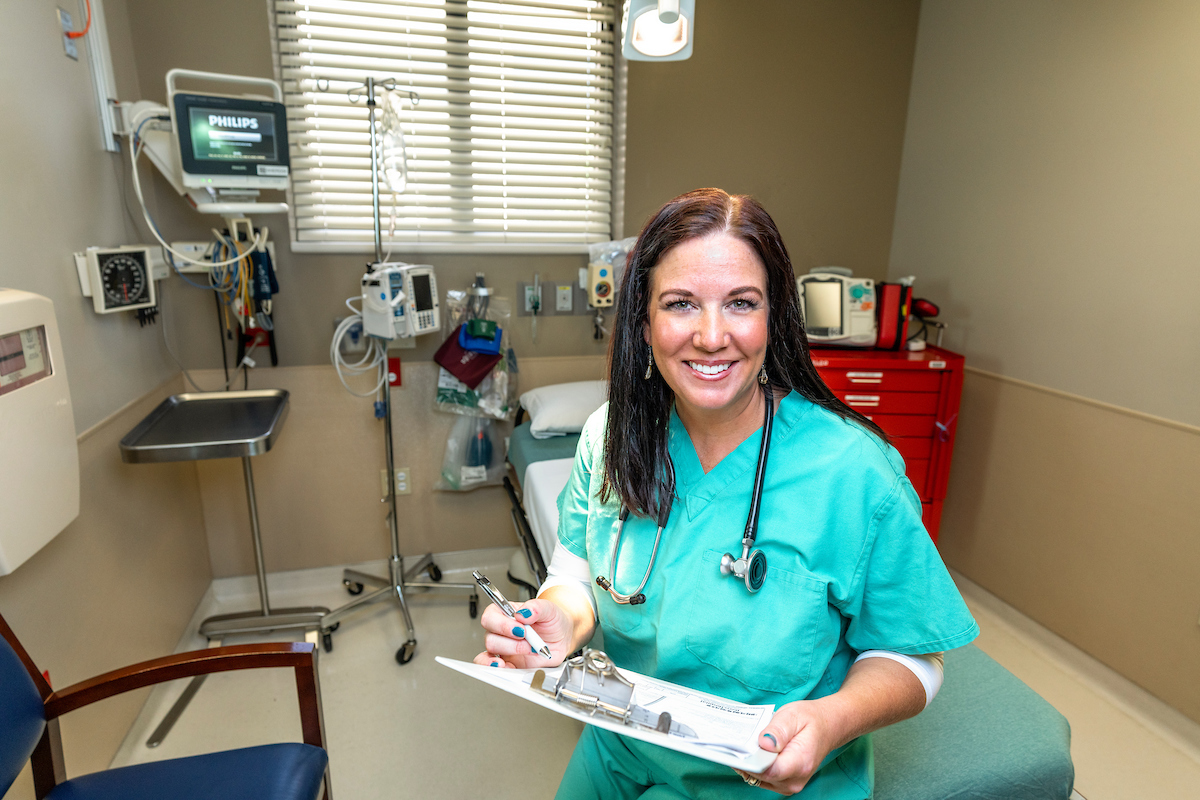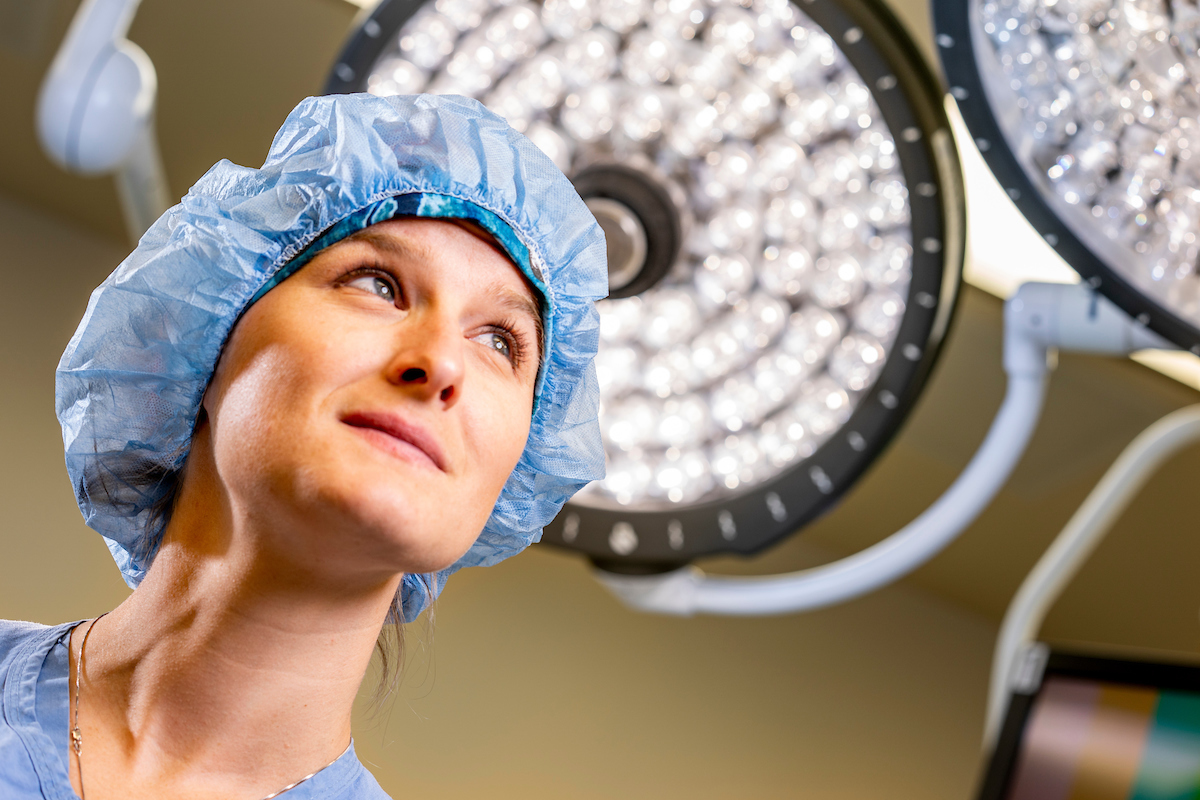
UVU’s paramedic program is leading students through an unconventional path toward medical school
By Kim Bojórquez | Photography by Jay Drowns
When Utah Valley University alumna Summer Grace goes to work as an emergency medicine physician, she says she’s ready for anything to roll in.
“When I go to work, I don’t know what I’m going to see that day; it's a mystery,” Grace says. “It keeps me on the edge of my seat and requires that I stay current on my medical knowledge.”
From the time she was 14 years old, Grace knew she wanted to be a physician. After attending UVU’s Firefighter Recruit Candidate Academy, she enrolled in the first paramedic class UVU offered in 2000. Grace was the first and only woman in the class.
“I have a lot of pride in the fact that I was in the very first class,” she says.
Grace says after working as a paramedic for several years, her experience with different illnesses and emergency scenarios made her interested in becoming an emergency medicine physician.
“Being a paramedic was great because it gave me a foundation in medicine,” Grace says. “It really helped in medical school because of my background.”
Now almost two decades after its inception, UVU’s paramedic program focuses on that experience as a way to prepare for future careers in medicine. About half of UVU’s paramedic students have intentions of furthering their education by attending medical school, dental school, or physician assistant school.
“One of the really nice things about going to paramedic school is that it exposes you to many realms of medicine,” Grace says. "Working as a paramedic requires you to make emergent, life-altering decisions about patient care in a few seconds. Even now, as a physician, the confidence I gained working as a paramedic helps me when I have to make difficult decisions.”

Looking through paramedic class rosters going back a decade, Steven Allred, director of UVU’s paramedic program, can point at each student’s face as if he were looking through photos of his children.
“She just began medical school, this one finished nursing and is trying to become a flight nurse, and these two just got into physician assistant school — I need to give them a call,” he says.
While UVU’s program maintains a reputation for rigor and real-world application, what makes the program special — according to Allred, who has 32 years of experience in the emergency room and as a firefighter paramedic — is a sense of community not found at other universities.
“Steve was fantastic,” says Alexandrea Perry, who graduated from the program in the summer of 2015 and is about to start as an operating room nurse at St. Anthony Hospital in Pendleton, Oregon. “I was the only female in the class, and after my husband graduated from the program, I was on my own.”
Knowing this information, Allred introduced Perry to his daughters, who were the same age.
“I hung out with his family and it was really nice. It was a nice break to get away from the business of the program and not to go home by myself,” Perry says.
Perry says Allred is known for creating a family-like environment within each cohort. For example, Allred says he once drove to Wyoming to attend the funeral of the grandfather of one of his students.
“I still talk to Steve to this day,” Perry says. “I use him as a reference for anything.”
Mat Goebel, a current medical student at the University of California San Diego, thinks of Allred as a father-like figure.
“The closeness is very uncommon in these types of programs and it’s really something that's unique about UVU,” Goebel says. “That culture comes from the top down and it never goes away. Steve sets that tone.”

Prior to joining UVU’s paramedic program in 2015, Perry had just been denied admission to Oregon Health and Science University’s nursing program.
Perry and her husband, who she met while attending Chemeketa Community College in Oregon, were looking for a paramedic program with a student focus and applied to UVU’s program after learning about it. She enrolled at UVU three months after her husband, with intentions to eventually pursue a nursing career.
“The faculty was amazing. They really worked with the students, and that's what we loved about it,” Perry says.
Perry says UVU faculty and instructors helped students “individually to get them where they needed to be.”
Perry also enjoyed getting to spend hours in hospitals and work with nurses to get hands-on experience, which is something other programs don’t offer.
“We got to do time in the operating room, emergency room, and the intensive care unit,” Perry says. “We were all over the place. We were literally all over the Salt Lake area and Provo.”
Perry believes her eight-month stint in the program helped set her apart from other applicants —she was able to reapply to the school in Oregon and get accepted.
The paramedic program, which is part of UVU’s College of Health and Public Service, and is located at UVU’s Provo Airport campus, is comprised of two semesters. The first is lecture- and book-heavy, and in the second semester, students participate in hospital rotations that include time spent in the operating room, labor and delivery, and the emergency room. Prior to joining the program, students must complete a year of prerequisite coursework and candidates are admitted through a competitive process.
Clinical rotations are unique because students go into an environment where they learn to intubate patients in the operating room with the direct supervision of an anesthesiologist to secure their airways prior to surgery.
“It gets in your blood and it’s a lot of fun,” Allred says. “You get kind of a taste for medicine, and I think that’s what happens to a lot of my students.”
In the labor and delivery rotation, students have the opportunity to participate directly in the delivery, observe, or assist with the post-care of the baby using respiratory therapists.
Allred says his program emphasizes that his students earn multiple certifications, which is extremely valuable to his students once they are in the field.
“I think what sets us apart is the strong faculty and outstanding staff, as well as the additional certifications that we offer paramedic students,” says Barbara Burr, assistant dean of CHPS. “I’ve seen our faculty and staff go above and beyond to help students succeed… that is not typical with a relatively short program.”
“The idea is that these students absolutely need to know how to do this in a situation beyond just reading it in a book,” Allred says.
Traditionally, students who strive to get into medical school major in sciences related to biology or biochemistry during their undergraduate careers and work hard to earn nearly perfect GPA scores. At UVU, Allred points out the ongoing trend where half of UVU’s paramedic school cohort plan on furthering their education.
“Medical schools are sensitive to the fact that being a biochemist and getting straight A’s isn’t a good indicator anymore,” said Goebel, who has participated in interviews with students who have applied for UC San Diego’s medical school. “I wish people took that sort of less traditional path to get some more clinical experience before they jumped into med school.”
Goebel didn’t always know he wanted to go into emergency medicine. He says he became interested in the field after graduating from Brigham Young University's theater program, where a lot of accidents occurred.
“Working in the theater environment is actually an industrial-work environment; people get hurt all the time,” Goebel says. “I’ve seen a lot of accidents and I wanted to learn more about what to do when people get hurt.”
Goebel’s curiosity toward medicine eventually led him to UVU’s paramedic program, which he joined in 2011.
Recently, Goebel faced a situation where he needed to manage a patient’s airways. Unlike other medical students in the room, he was able to jump in and do what needed to be done.
“I was able to step up rather than be a wallflower,” Goebel says. “Most medical students haven’t had that experience.”
Goebel credits UVU’s paramedic program for preparing him for these types of situations.
“That experience has still been incredibly valuable even now as a medical student — I’m able to jump in when people need it, and people recognize me for it,” Goebel says. “The experience makes me stand out as a medical student.”
Goebel says he chose UVU because it was one of the few paramedic programs in the region that was associated with an institution of higher education.
“It was the most rigorous and academic,” Goebel says. “It was the kind of challenge that I wanted.”